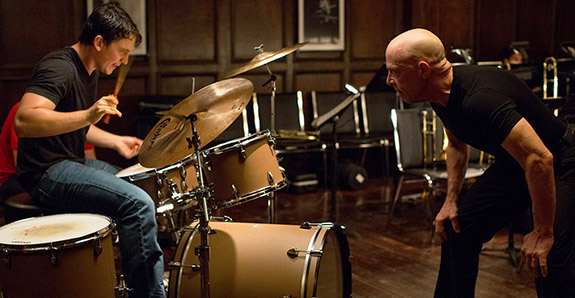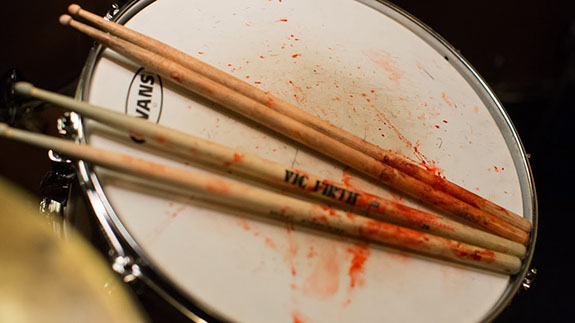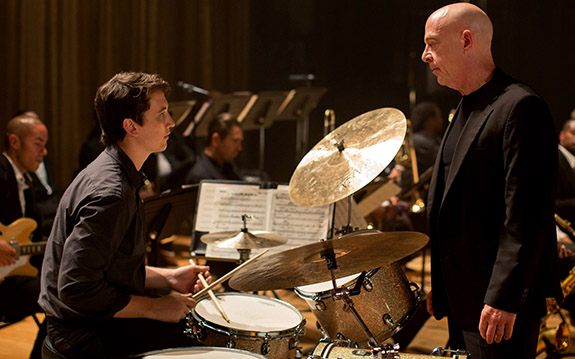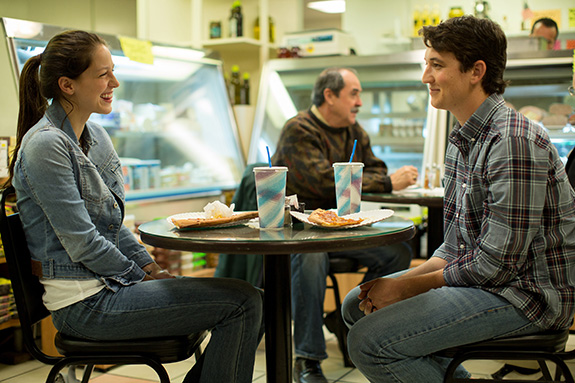
TN: Look, before I can dive in, I gotta give you a little bit of personal backstory. I know it’s gauche for a film critic to talk about himself, but it’s more than a little relevant, and I promise not to be too precious. I started playing trumpet when I was ten. Two years later I started playing in middle school jazz band. I wasn’t a prodigy, but I was pretty good at it. Yes, I attended band camp most summers. I attended two reputable arts magnet schools, the kind of schools you have to audition for. In my junior and senior years of high school, I was playing in the school’s top level jazz band. It wasn’t easy, but it was fun. I was never the king of the trumpet section, but like I said: I was pretty good. I had a band director that was a tough but fair mentor; a good man. I could’ve gone on to play in college. I didn’t. I put down the trumpet a few years after I graduated.
MC: My background is something similar. I played drums for six years in middle school, high school, and band camp. By the time I graduated, I was the lead bass in a drumline that was treated like rock stars for how popular we were. I also played symphonic band, but jazz band was absolute torture.
I had classmates who were so incredibly good at drumming because they were complete assholes who didn’t care about anything else. I had a drum tutor who heaped on the verbal abuse and kept pushing me toward a professional career in drumming, just because he didn’t know a damned thing that didn’t have to do with drums.
Then I went to college, and the music majors there scared the living crap out of me. I could swear that anything outside the performance hall didn’t even exist as far as they were concerned. I did eventually go back to drums. I’m once again a bass drum section leader, this time in a community drumline playing upwards of 80 gigs a year, but I will never go any further in music than I am right now. Because when I was growing up, I personally knew the characters of Whiplash. And as much as I admired them, I didn’t want to be anything like them.
Whiplash begins with a young non-prodigy who has more ambition than skill. Andrew Neyman (Miles Teller) dreams of being the next Buddy Rich, but he’s stuck turning pages of sheet music for the better drummer in the lower-level jazz band at his prestigious conservatory. He desperately wants to earn a spot in the upper-level jazz band, but he would have to win the approval of director Terence Fletcher (J.K. Simmons), who might be the most frightening man in New York. However, Fletcher sees something in Andrew, and before long, Andrew finds out why everyone is so scared of Terence Fletcher.
This is one of the year’s most buzzed-about limited release films; a definite awards season contender in a few categories. Filmmaker Damien Chazelle gives us an equally stylish, but more down-to-earth film here than the enjoyably silly Grand Piano (which he scripted). Whiplash is shot extraordinarily well, with gorgeous lighting and arresting shot compositions. The film’s warm palette avoids trendy neon hues, which is refreshing. The budget for the film is low (3.3 million according to Box Office Mojo), but it never looks cheap and doesn’t have the spotless, fluid look of many films shot digitally. Technically speaking, Whiplash is very well put together. But narratively, there are some troublesome things that prevent it from being one of the year’s best films.
The camera is practically its own character in this movie. Chazelle uses close-ups, quick-cuts, and camera movements in such a way that the visuals are every bit as dynamic as the music. The presentation does so much to put us in the headspace of the characters, not only amplifying every precise movement but also showing every last drop of blood and sweat that’s poured into the music. And man oh man do I mean that literally.

Whiplash is one of those movies that takes place inside a real world professional subculture, which means it will face tough criticism from viewers who understand that professional subculture. In a two hour film, you’ll never be able to portray exactly what being a surgeon or a crime scene investigator is like. If you want these things to feel real to the audience, your only hope is to distill this professional subculture down to its essence, like what Picasso did with the bull. But you can only change and remove so many elements before it begins to push the limits of plausibility. Most viewers won’t notice (through no fault of their own) and that’s why we’re still making movies like The Hurt Locker (which is thrilling, but raises a middle finger to actual US Army standard operating procedures). Whiplash pushes the limits of plausibility in ways that don’t make a lot of sense to a musician, but I don’t think non-musicians will care.
Writer/Director Damien Chazelle knows what it’s like to be a drummer, but chose to approach the subject in way that is more visceral than intellectual, distilling “practice” down into scenes where Andrew hammers the shit out of his ride cymbal and snare drum until his blisters pop. For anyone wondering, that’s not practice. That’s just silly. Andrew’s problem is that he can’t keep up with Fletcher’s lightning fast tempos. Perhaps a better (and more visual) way of showing Andrew’s progression would have been to show him practicing with a metronome, and showing him getting faster and faster as the metronome is cranked higher and higher. You wouldn’t even need sound in a scene like that. It would be the equivalent of the sports movie montage where the coach uses a stopwatch. The result of Andrew’s messy “practicing” is that I wasn’t sold on his eventual progression. Whiplash inherits a lot of its structure from sports films (the Rocky series comes to mind), but it suffers from a lack of focus on our protagonist’s skills. Rocky III is the best boxing movie in the series because it focuses on specific skills that Rocky will need to beat Clubber Lang. Whiplash‘s more unfocused and nebulous approach to Andrew’s skills makes the climax of the film feel a bit preposterous, like Andrew is suddenly possessed by the specter of Buddy Rich. He hasn’t earned it, and that’s a big problem for a narrative that relies on the progression of his skills.
I’m here to tell you that yes, blisters and callouses are totally part of playing drums. In my current drumline, they’re practically considered trophies. Granted, I’ve never seen someone actually bleed on a drum set just from playing so hard, but I’ve never seen anyone try playing swing at 400 BPM for a sustained length of time either (and I’m not pulling that number out of my ass, that’s the tempo specified in the movie). Drums are a highly athletic instrument and a “visceral” portrayal of that is completely appropriate.
Don’t get me wrong, I’m not doubting the existence of blisters in drumming, it’s just that the practice scenes seem to focus almost exclusively on Andrew’s physical and mental destruction, instead of focusing on how he’s becoming a better player.
You do raise a perfectly valid point with regards to the practicing scenes. The absence of a metronome is especially puzzling; I’ve never practiced without one and I’ve never heard of a drummer who did. More importantly, there’s no sense of how much time has passed during those montages or how Andrew has come so far as a result of all that practice. I’ll grant that I didn’t even notice while I was in the theater — Miles Teller’s incredible performance does a lot to sell the development — but it does seem rather strange in retrospect that Andrew could go directly from punching a bloody hole in his snare drum to showing up for recital with every measure of a song committed to memory. There is a bridge from A to B, it’s just not a very sturdy one.

“Earning it” is all the more important, because that’s one of things Fletcher is frequently screaming about. And boy, does he scream. His abuse is so extreme that it challenges the suspension of disbelief. Fletcher is a villain in every sense of the word. He is rude, egomaniacal, diabolical, conniving, homophobic, and borderline psychopathic, but what makes him so fascinating is that Andrew so desperately seeks his approval. Andrew’s dad (an affable Paul Reiser) is quick to give approval, but Andrew is the kind of kid that needs a challenge. Fletcher is Clubber Lang, Ivan Drago, and Mickey Goldmill all in one. He’s an evil motherfucker, but the film does attempt to humanize him by letting us see him speak amiably to a young girl and her father (presumably the only two people he doesn’t call “faggot” in the entire movie). J.K. Simmons is scary good in the role, delivering a fire and brimstone performance that might make Fletcher one of the great cinematic villains of the year, and that’s a hell of an achievement when you’re released in the same year as Gone Girl.
Speaking of Fletcher’s vocabulary: I don’t know how you feel about profanity in films, but if you read through my articles and reviews you’ll discern that I am a fan of profanity. But when profanity becomes so common that it acts as the ugly spaces between words, it essentially loses all meaning and just becomes verbal chaff that I can’t bear to hear anymore. At a certain point, I feel like it gets in the way of better dialogue.
What really makes Fletcher so scary is that everything he says and does could be taken at least two ways. Every time he starts acting nice, he could just be looking for ammunition or weak spots. He says that he wants to push his students toward greatness, or maybe he’s just a sadist who gets off on abusing his students in every possible way. But then Andrew starts fighting back, and that’s when things really get interesting.
There’s a very real possibility that Fletcher is creating his own worst enemy, and based on Simmons’ performance, I’m pretty sure that’s the only thing Fletcher is genuinely scared of. Fletcher says that he wants to find the next Charlie Parker, and even if we take that at face value, there’s the possibility that he hasn’t thought that goal through. Assuming there really is another great player in his flock; someone strong, skilled, determined, and psychotic enough to not only hold his own against Fletcher but beat the son of a bitch at his own game; what the hell is Fletcher going to do about it? Will he guide that student to greatness, or destroy him completely? Hell, maybe they could end up destroying each other.
That’s a great point, and I do get the sense that Fletcher has finally found someone arrogant, stubborn, angry, and hungry enough to be his foil. While Fletcher might be a complete monster, Andrew feels that Fletcher is is the only person with the qualifications to deem him a success. It’s a great source of dramatic conflict.
It goes back to the film’s central question of what constitutes success. Is it better to die alone and famous by drug overdose at 35, or to die a 90-year-old mediocrity surrounded by friends and family? The film does a lot to establish the stakes, telling us about competitions that could potentially lead to high-profile jobs and so on, but even then, there’s still the question of whether that’s worth the blood and sweat that Andrew is putting into his craft (again, LITERALLY). This is very nicely illustrated by a family dinner scene in which no one can seem to understand exactly what Andrew is shooting for. But when some cousins show up and they’re doing great in college football, that is something that everyone can respect.

Then there’s the matter of Nicole (Melissa Benoist), who briefly appears as the love interest. She helps represent the idea that while Andrew does have an interest in something other than drums — sex, for example — he’s just decided that he wants to be a great drummer more. This forces him to consider what he’s potentially giving up in return for suffering through an abusive teacher and months of self-flagellation. Moreover, Andrew has a very clear path laid in front of him while Nicole is still trying to figure things out. This difference is so glaring that it begs the question of why Andrew asked her out in the first place, but I’m not even sure if Andrew himself could give a decent answer to that question at the time.
I feel like there were more scenes with the girlfriend that ended up on the cutting room floor, but I like that she was in the movie so little. It means that Andrew regarded her as disposable, and that’s appropriately reflected in the film.
Yet there’s still a sense that Nicole is an actual person with a whole other life taking place offscreen. Benoist deserves a lot of credit for making that work.
Absolutely. She brings a much needed warmth to the film. Before wrapping this up, I must make mention of the soundtrack (out now, courtesy of Varese Sarabande), which I was asked to review. My jazz bias is strong here, but this is one of the year’s top soundtracks. The big band arrangements, particularly that arrangement of Juan Tizol’s Caravan, are out of this world. The score, written by composer/screenwriter Justin Hurwitz (who was also director Damien Chazelle’s Harvard roommate) is impressive as well, and may be one of the better jazz scores since L.A. Noire. Most of the source music in the film is written by Hurwitz as well, like When I Wake (the song that plays in the pizza parlor), which beautifully emulates the sound of an old Duke Ellington recording. Composer Tim Simonec wrote the film’s most diabolical and difficult big band piece: Upswingin’. Its unpredictably syncopated rhythms feel specifically composed to humiliate Andrew. It’s brilliant.
No complaints at all about the music. I’d only add that there were a few times when the actors were very clearly synching with a recorded track, and I’ll be damned if that really was Miles Teller playing every single percussive note heard on the soundtrack. Still, the camerawork and editing are generally good enough to sell the illusion within limits of suspending disbelief.
In closing, Whiplash is a film that excels technically, but comes up a bit short narratively and intellectually. It doesn’t devote enough screen time to the upward development of Andrew’s skills, distilling the process down into an essence that tastes slightly off. It’s an incredibly visceral film, to a fault. It’s a beautifully realized and effective character drama, but it doesn’t quite live up to the film festival hype.
The pacing is definitely a problem, as the film goes from extremely fast to incredibly slow without much of a middle ground in between. Everything about this film seems built to exhaust the audience, but that works both for it and against it. At only a hundred minutes, the film certainly could have used another couple of minutes to help sell the protagonist’s development, though Miles Teller undeniably did a superb job with what he had. Likewise, J.K. Simmons brought a degree of subtlety to the character that couldn’t possibly have been there in the script. And of course, Chazelle brought some incredible music and visuals with a side of interesting themes expressed in poignant ways. Overall, I personally thought that the drawbacks were more like nitpicks and I still give the movie my full recommendation.
To sum up: “Good job.”
Travis’s Rating: 




Out of a Possible 5 Stars